Dissemination and communication
In this section, we share conference contributions, scientific publications, and other materials related to the MEMA project. The aim is to promote the dissemination of the results obtained and the innovative practices developed during the research activities. The publications will include peer-reviewed articles, conference proceedings, and educational resources, providing valuable insights for the scientific community and educators interested in integrating mathematical memes into teaching.
Academic Research: contributions to scientific conferences

RESEARCH MIXOLOGY: BLENDING MATHEMATICS EDUCATION & DIGITAL SOCIOLOGY FOR A HYBRID APPROACH TO EXPERIMENTAL DESIGN
Giulia Bini, Sara Gagliani Caputo, Pietro Saccomanno and Diego Ceccobelli
Free University of Bozen-Bolzano (Italy)
Poster, February 2025
This contribution, intended for the international CERME14 (Congress of the European Society for Research in Mathematics Education) conference in Bolzano (Italy), presents a poster that develops the early stages of the MEMA project, with a focus on building a team with hybrid expertise and designing a hybrid experimental framework to investigate the role of mathematical memes in education. The work adopts the mixology metaphor to describe the methodological approach: rather than integrating theories into a single perspective through a networking approach, it combines the analytical tools of Mathematics Education (ME) and Digital Sociology (DS) to preserve disciplinary specificity while fostering complementary insights. The poster illustrates how the metaphor guides the blending of theoretical models and analytical tools, providing a coherent yet multidimensional view of the phenomena under study.
🖥️View the presentation slides at this link
📖 Read the contribution: Research mixology: Blending mathematics education & digital sociology for a hybrid approach to experimental design

The poster won the ERME BEST POSTER AWARD 2025 with the following evaluation:
The poster explores cultural memes in mathematics education through a transdisciplinary approach, drawing on mathematical cultural capital, and features a distinctive graphic language


MEME-INGFUL MATH: EXPLORING THE IMPACT OF DIGITAL HUMOR ON LEARNING AND COHESION
Pietro Saccomanno, Giulia Bini, Sara Gagliani Caputo
ICEDU Conference, Bangkok (Thailandia)
Oral communication, April 2025
This contribution, presented at the international conference ICEDU 2025 (11th International Conference on Education 2025), showcases the quantitative findings of the MEMA project, with a particular focus on the analysis of variations in Perceived Class Cohesion (PCC) before and after the intervention. The goal of this presentation is to disseminate empirical data collected through a randomized controlled trial conducted in an Italian secondary school, fostering discussion on the relationship between digital culture, classroom cohesion, and mathematics learning. The contribution will illustrate how participation in shared digital practices can influence students’ sense of belonging to their classroom community. The first quantitative results on PCC will be discussed, highlighting the potential of memes not only as tools for mathematical expression but also as mechanisms for strengthening classroom relationships. This presentation is part of a broader discussion on strategies for making mathematics education more inclusive, emphasizing the value of pedagogical approaches that acknowledge and integrate students’ digital cultural capital.
🖥️View the presentation slides at this link
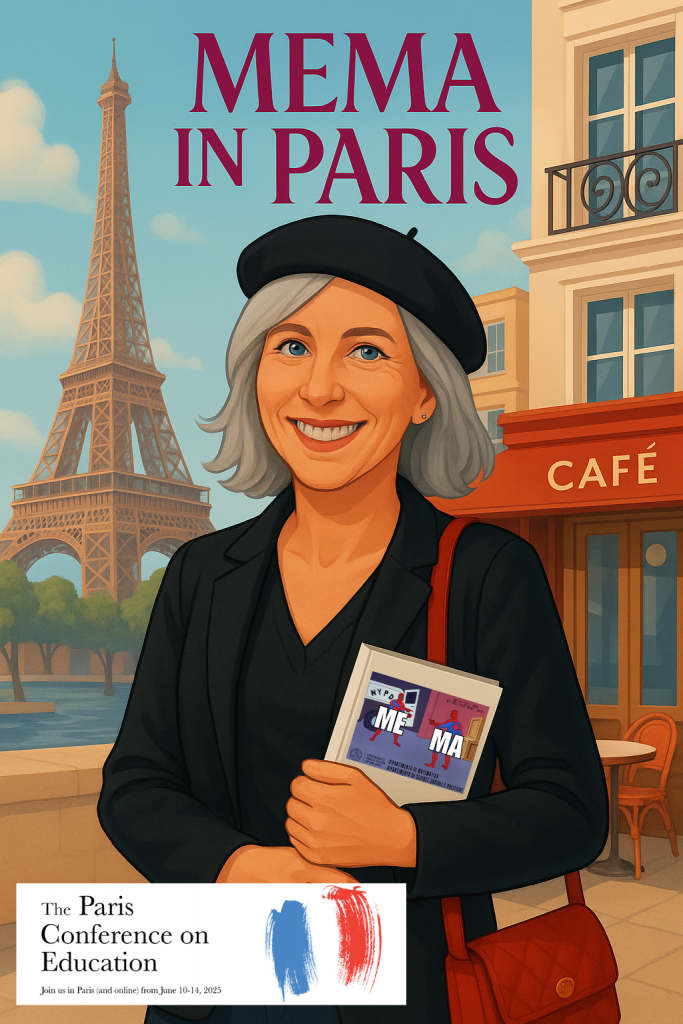
A MEME IS WORTH A THOUSAND FORMULAS: THE POWER OF MEMES IN THE TEACHING AND LEARNING OF MATHEMATICS
Giulia Bini, Sara Gagliani Caputo, Pietro Saccomanno and Diego Ceccobelli
PCE 2025 Conference, Parigi (Francia)
Oral communication, June 2025
This contribution, presented at the international conference IAFOR-PCE 2025 (4th Paris Conference on Education), introduces the MEMA project in its entirety, aiming to share its core ideas with a broad audience of researchers and education professionals. The focus is on the inclusive and transformative potential of mathematical memes, exploring how digital culture can be integrated into teaching to expand access to mathematics and promote non-traditional forms of expression. The presentation will cover the project’s theoretical foundations, methodological framework, and initial findings, with particular attention to the concept of Mathematics Capital (MC) and strategies to engage students with low MC through meme creation and sharing. The goal is to stimulate discussion on innovative teaching practices and how active participation in digital culture can reshape students’ relationship with mathematics.
🖥️View the presentation slides at this link
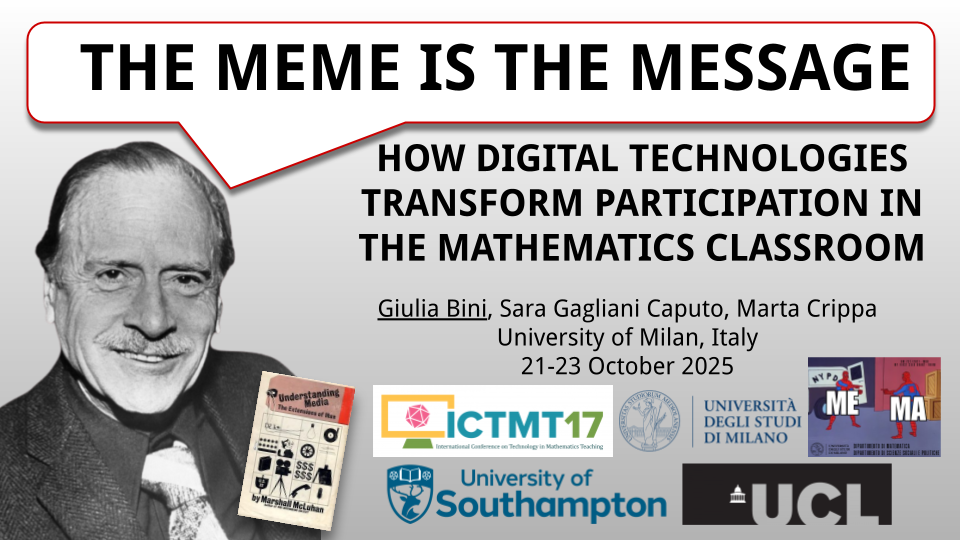
THE MEME IS THE MESSAGE: HOW DIGITAL TECHNOLOGIES TRANSFORM PARTICIPATION IN THE MATHEMATICS CLASSROOM
Giulia Bini, Sara Gagliani Caputo, Marta Crippa
ICTMT17 Conference, London (UK)
Oral communication, October 2025

This contribution, presented at the international conference ICTMT17 (17th International Conference on Technology in Mathematics Teaching), draws on Marshall McLuhan’s insight that the medium is the message. In the context of mathematics education, this means that what matters is not only the content but also the expressive forms that convey it and reshape participation. Using data from the MeMa project, the paper shows how the creation of mathematical memes in three Italian secondary school classes opens new and more inclusive spaces for engagement, giving a voice even to those who usually remain silent. Memes thus become not merely digital tools, but cultural practices that allow students to challenge established norms, share errors and cognitive tensions, and redefine what counts as meaningful participation in mathematical discourse.
🖥️View the presentation slides at this link
Academic Research: Peer reviewed publications

DEVELOPMENT AND VALIDATION OF A QUESTIONNAIRE ON STUDENTS’ MATHEMATICS CAPITAL: A TOOL TO EXPLORE OPPORTUNITIES IN THE MATHEMATICS CLASSROOM
Giulia Bini, Sara Gagliani Caputo and Giulietta Zanga
Research article, Education Sciences, Volume 15, Issue 4, 510
Understanding students’ opportunities in mathematics education requires tools that capture the social and cultural dimensions shaping their engagement with the subject. One way to conceptualise these opportunities is through the notion of mathematics capital, which encompasses the resources and dispositions that students bring to their mathematical experiences. This study introduces and validates a questionnaire designed to measure secondary students’ mathematics capital, adapting the well-established science capital framework to the mathematical domain. Grounded in Bourdieu’s concept of capital, the questionnaire operationalises mathematics capital across mathematical forms of cultural capital, mathematics-related behaviours and practices, and mathematics-related forms of social capital. The questionnaire was administered to 119 students in an Italian secondary school as part of a broader study on mathematical memes. Statistical analyses, including correlation tests and Cronbach’s alpha, confirm the instrument’s reliability and internal coherence, highlighting the influence of both school and extracurricular environments. The questionnaire provides educators with a practical tool to better understand students’ engagement with mathematics and to inform strategies for fostering equity in mathematics education. By making mathematics capital a measurable construct, this research contributes to discussions on how cultural and social factors shape students’ trajectories in mathematics and beyond.
📖 Read the complete article
Academic Research: Invited research seminars
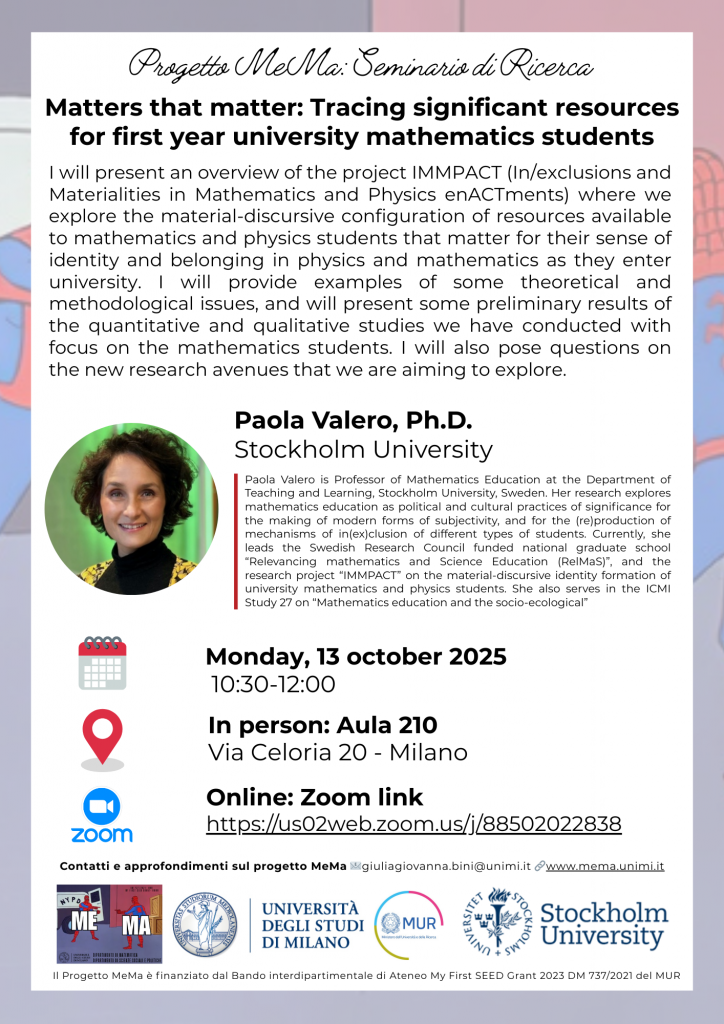
MATTERS THAT MATTER: TRACING SIGNIFICANT RESOURCES FOR FIRST YEAR UNIVERSITY MATHEMATICS STUDENTS
Paola Valero, Stockholm University (Sweden)
Research Seminar, 13 October 2025
Paola Valero presents an overview of the IMMPACT project (In/exclusions and Materialities in Mathematics and Physics enACTments), which explores the material-discursive configurations of the resources available to mathematics and physics students that are relevant to their sense of identity and belonging in physics and mathematics as they enter university. She provides examples of some theoretical and methodological issues and presents preliminary results of the quantitative and qualitative studies conducted, with particular attention to mathematics students. Finally, she raises questions about the new lines of research that the group aims to pursue.
The IMMPACT project uses the construct of mathematics capital to analyse the material and discursive resources that students can mobilise in the construction of their mathematical identities; this perspective complements and integrates that of the MEMA project, contributing to a richer scientific understanding of this construct.
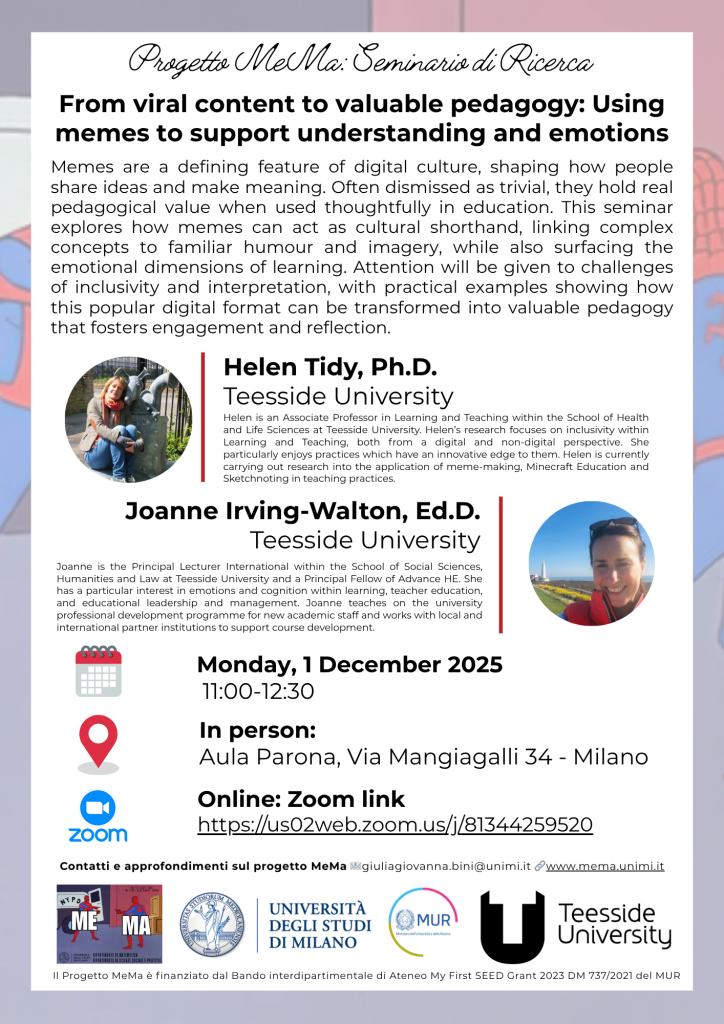
FROM VIRAL CONTENT TO VALUABLE PEDAGOGY: USING MEMES TO SUPPORT UNDERSTANDING AND EMOTIONS
Helen Tidy & Joanne Irving-Walton, Teeside University (UK)
Research Seminar, 1 December 2025
Helen Tidy and Joanne Irving-Walton present a seminar on how memes, a defining feature of digital culture, shape the ways in which people share ideas and construct meaning. Often dismissed as trivial, memes nevertheless hold genuine pedagogical value when used thoughtfully in educational contexts.
Drawing on their experience in the field of forensic science, the speakers show how memes can serve as cultural shorthand, linking complex concepts to familiar humour and imagery, while also highlighting the emotional dimensions of learning. Attention is given to the challenges of inclusivity and interpretation, with concrete examples illustrating how this widespread digital format can be transformed into a pedagogical resource that fosters engagement and reflection. This approach also resonates with the objectives of the MeMa project, which investigates the use of memes in mathematical contexts: further evidence that, across different scientific domains, memes can function as inclusive tools through which students re-elaborate and share disciplinary knowledge.
Schools: Initiatives for teachers’ professional development

MEME MATEMATICI: RISORSE EDUCATIVE DAL WEB PER LE CLASSI DEL XXI SECOLO [MATHEMATICAL MEMES: EDUCATIONAL RESOURCES FROM THE WEB FOR 21ST CENTURY CLASSROOMS]
Giulia Bini
Bari (Italy), Department of Mathematics, University of Bari “Aldo Moro”
Seminar, 4 September 2024
The MEMA project is presented to secondary school teachers at the MEDA4 ((Mathematics Education in the Digital Age) conference, organized by the University of Bari. The session focused on the use of innovative tools to enrich students’ learning and mathematical identity within the context of digital culture. During the presentation, the use of mathematical memes was demonstrated with interactive examples, showing how this resource can stimulate student engagement and facilitate the understanding of mathematical concepts through visual and digital languages. Teachers participating in the Liceo Matematico project had the opportunity to explore practical applications for integrating memes into their daily teaching activities.

MEME MATEMATICI: STRUMENTI DI APPRENDIMENTO PER LA GENERAZIONE DIGITALE [MATHEMATICAL MEMES: LEARNING TOOLS FOR THE DIGITAL GENERATION]
Giulia Bini
Parma (Italy), Convitto Nazionale Maria Luigia
Seminar, 10 September 2024
The MEMA project is presented to primary and secondary school teachers as part of the event “Mathematics Challenges for the Future 2” organized by the Department of Mathematics at the University of Parma. The focus of the session was on the use of innovative tools to foster learning and mathematical identity within the digital generation. During the presentation, the use of mathematical memes was demonstrated to the teachers through interactive examples, highlighting how this educational resource can stimulate student engagement and promote the understanding of mathematical concepts through visual and digital forms of communication..
🎞️ Watch the video recording of the talk (in Italian with subtitles)

MATEMATICA E SOCIAL MEDIA [MATHEMATICS AND SOCIAL MEDIA]
Giulia Bini
Milano, Università degli Studi
Seminar, 3 April 2025
The MEMA project is presented to secondary school teachers as part of the course Physical and Digital Tools for Laboratory-Based Mathematics Learning – Renewals, promoted by Liceo Banfi in Vimercate (MB) and included in the Futura. The School for Italy’s Tomorrow programme. The session focuses on exploring innovative tools to support mathematics learning and to strengthen the mathematical identity of younger generations. Within this framework, the MEMA approach was illustrated through interactive examples of mathematical memes, highlighting how such resources can foster active student participation and contribute to the construction of mathematical meaning through visual and digital forms of communication. The event includes a one-hour theoretical session and a two-hour laboratory session.
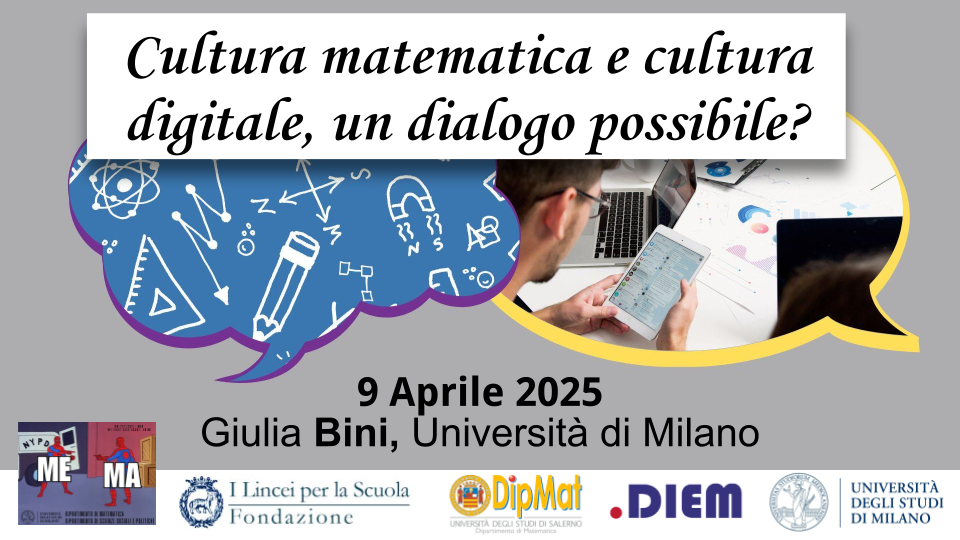
CULTURA MATEMATICA E CULTURA DIGITALE, UN DIALOGO POSSIBILE? [MATHEMATICAL CULTURE AND DIGITAL CULTURE, IS A DIALOGUE POSSIBLE?]
Giulia Bini
Fisciano (SA, Italy), Department of Mathematics, University of Salerno
Seminar, 9 April 2025
In April 2025, the MEMA project is presented to secondary school teachers as part of the 2024/2025 professional development course “The New Frontiers of Digital Technology in Mathematics: What Opportunities for Teachers and Students?” organized by the Department of Mathematics at the University of Salerno in collaboration with the “I Lincei per la Scuola” Foundation. The event includes a one-hour theoretical session and a two-hour laboratory session. The seminar explores how digital media, when used consciously, can facilitate a dialogue between mathematical culture and digital culture, opening new perspectives for teaching mathematics. During the laboratory session, participants have the opportunity to experiment with the use of digital tools in the classroom, integrating these resources effectively into their everyday teaching practice.
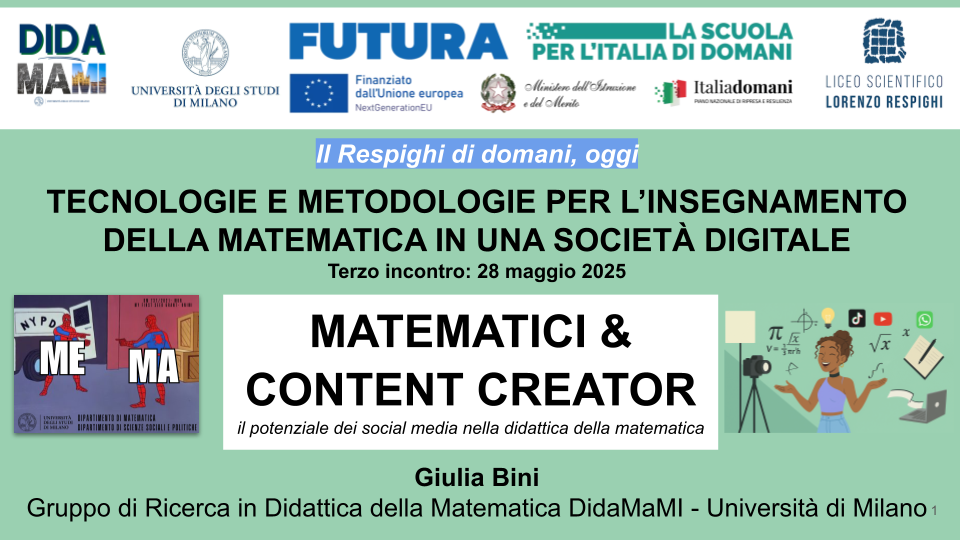
MATEMATICI & CONTENT CREATOR: IL POTENZIALE DEI SOCIAL MEDIA NELLA DIDATTICA DELLA MATEMATICA [MATHEMATICIANS & CONTENT CREATORS: THE POTENTIAL OF SOCIAL MEDIA IN MATHEMATICS EDUCATION]
Giulia Bini
Piacenza, Liceo Scientifico Lorenzo Respighi
Seminar, 28 May 2025
In May 2025, the MEMA project will be presented to secondary school teachers as part of the 2024/2025 training course “Il Respighi di domani, oggi – Technologies and Methodologies for Teaching Mathematics in a Digital Society”, organised by the Liceo Scientifico Lorenzo Respighi in Piacenza. The seminar offers a reflection on the role of social media in recognising and enhancing students’ mathematics capital, understood as the set of cultural, familial, and identity-related resources that shape their relationship with the discipline. Structured in a theoretical session (1.5 hours) and a hands-on workshop (2.5 hours), the event explores how activities based on the creation and discussion of digital content—such as mathematical memes and animated gifs—can support a dialogue between mathematical and digital cultures, making implicit knowledge visible and enabling new forms of student participation. During the workshop, teachers will have the opportunity to experiment with digital tools and teaching strategies that can be adapted to everyday classroom practice.
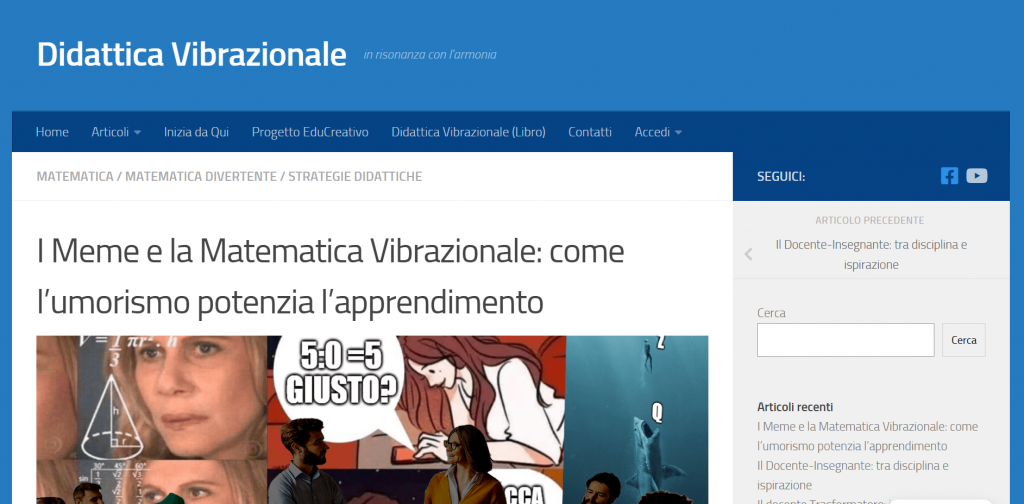
I MEME E LA MATEMATICA VIBRAZIONALE: COME L’UMORISMO POTENZIA L’APPRENDIMENTO [MEMES AND VIBRATIONAL MATHEMATICS: HOW HUMOUR ENHANCES LEARNING]
Claudia Bartoli
webpage on the Didattica Vibrazionale website, 30 August 2025
The MEMA project is presented to teachers and education enthusiasts through Claudia Bartoli’s website, Didattica Vibrazionale, in an article entitled “Memes and Vibrational Mathematics”. The contribution combines the potential of memes as educational tools with a teaching approach that places students’ well-being, awareness, and focus at its centre, conceived as a bridge between mathematical culture and digital languages. It offers both theoretical insights and practical resources for classroom use.
📖 Read the complete article: I Meme e la Matematica Vibrazionale: come l’umorismo potenzia l’apprendimento (in italian)
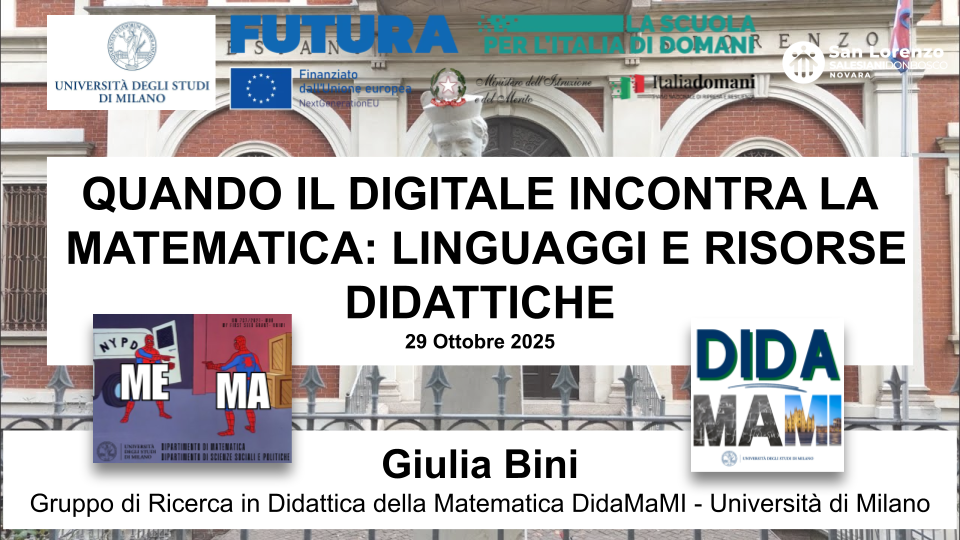
QUANDO IL DIGITALE INCONTRA LA MATEMATICA: LINGUAGGI E RISORSE DIDATTICHE [WHEN THE DIGITAL MEETS MATHEMATICS: LANGUAGES AND EDUCATIONAL RESOURCES]
Giulia Bini
Novara, Istituto Salesiano San Lorenzo
Seminar, 29 October 2025
In October 2025, the MEMA project is presented to lower and upper secondary school teachers as part of the training programme established by DM 66/2023 – Teacher training for the digital transition, organised by the Salesian Institute San Lorenzo Don Bosco in Novara. The meeting includes a theoretical session (1h) and a workshop session (2h). The first part offers a reflection on the role of digital languages in shaping the mathematical identity of younger generations; in the second part, teachers experiment with activities based on mathematical memes. These activities show how such materials can stimulate students’ participation, foster argumentation, and open new perspectives for the teaching of mathematics in twenty-first-century classrooms.
Public Engagement: communication to the wider public

MATEMATICA E MEME: LA STRANA EQUAZIONE CHE FUNZIONA! [MATH AND MEMES: AN UNLIKELY EQUATION THAT WORKS!]
webpage on the Leonardo Foundation website, 26 February 2025
The MEMA project is presented to the public thanks to the collaboration with the Leonardo Foundation, a third-sector organization that promotes cultural growth on topics related to science, industry, and technology through outreach, training, and networking activities, with a focus on STEM disciplines and the involvement of schools and universities.
🎞️ Watch the video interview and 📖 read the complete article at this link (in Italian)
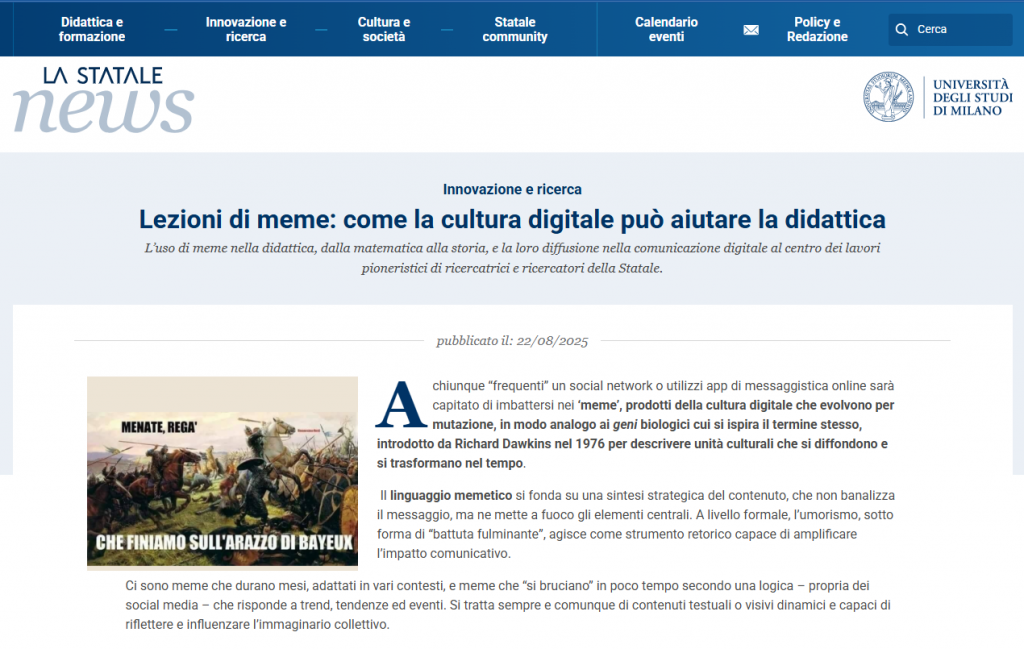
LEZIONI DI MEME: COME LA CULTURA DIGITALE PUÒ AIUTARE LA DIDATTICA [LESSONS IN MEMES: HOW DIGITAL CULTURE CAN SUPPORT TEACHING]
webpage on La Statale News website, 22 August 2025
The MEMA project was presented to the general public through an article published on La Statale News entitled “Lessons in Memes: How Digital Culture Can Support Teaching” (22 August 2025) and shared across the University’s social media channels. The article shows how memes can become innovative teaching tools in different disciplinary fields: alongside MEMA, it highlights the work of Marina Gazzini on the use of memes in teaching and historical research, Giulia Giorgi’s sociological perspective with a focus on generational cultures, and Pietro Saccomanno’s studies on how memes shape political communication and the opinions of younger generations. Within this interdisciplinary framework, MEMA contributes by exploring how mathematical memes can expand opportunities for interaction and for the construction of shared meanings in education.
📖 Read the complete article on La Statale News: Lessons in Memes: How Digital Culture Can Support Teaching (in italian)
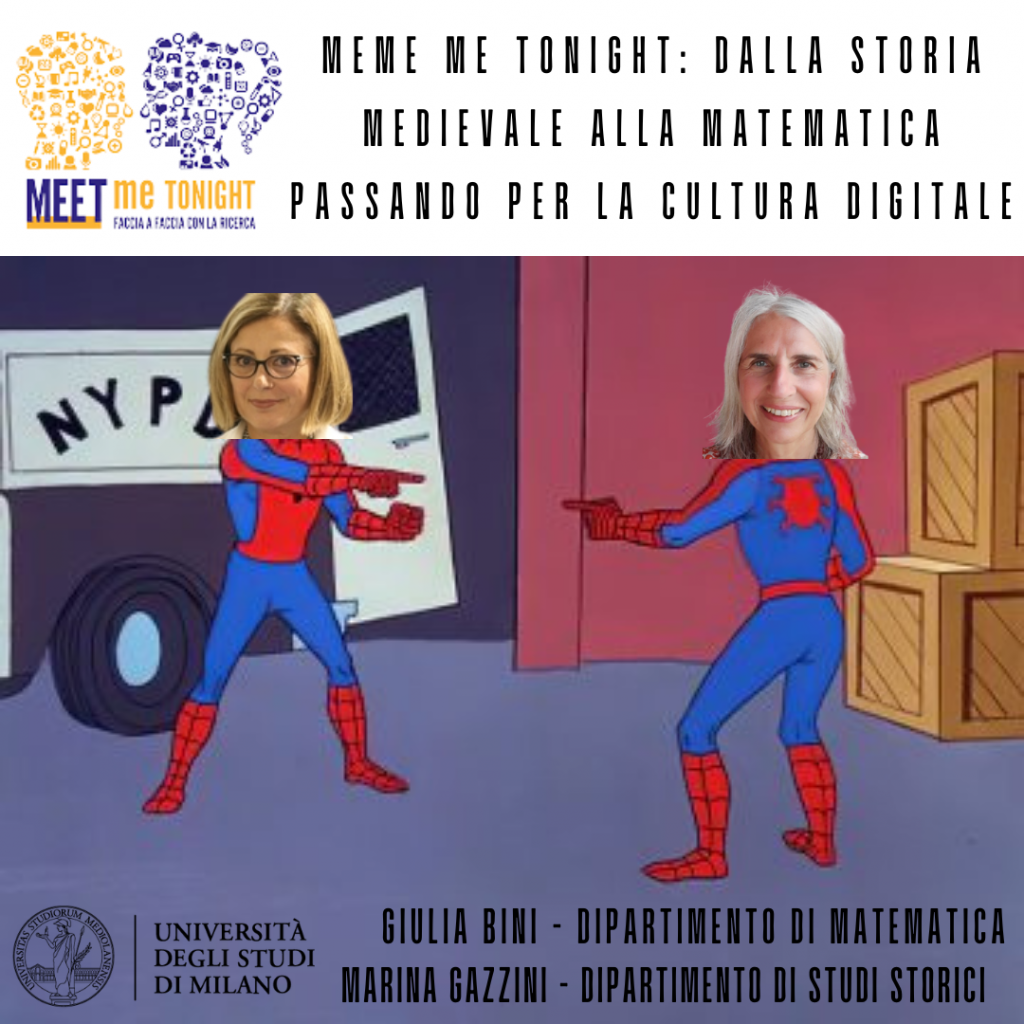
MEMA PROJECT AT THE EUROPEAN RESEARCHERS’ NIGHT: WHEN MATHEMATICS MEETS MEMES (AND THE MIDDLE AGES)
Talk, 26 September 2025, 19:20
Aula Magna dell’Università degli Studi, Via Festa del Perdono 7 Milano
The MEMA project will take part in MEET – Missions: Engagement and Education for Tomorrow, the European Researchers’ Night taking place in Milan on 26 and 27 September 2025. As part of the programme, Giulia Bini (Department of Mathematics) and Marina Gazzini (Department of Historical Studies) will present the talk “MEME ME TONIGHT: from the Middle Ages to Mathematics through Digital Culture.” Through a two-voice dialogue and concrete examples, the talk will explore the potential of memes as a language capable of crossing periods and disciplines, conveying complex content, supporting meaning-making, and opening up new forms of participation in educational settings.
🎞️ Watch the video recording of the talk

MEMA PROJECT AT BOOKCITY2025
THE POWER OF THE 3M: MEMES, MIDDLE AGES, MATHEMATICS
Meeting, 12 November 2025, 10:30-12:30
Room 111, Università degli Studi, Via Festa del Perdono 3 Milano
The MEMA project will take part in BookCity 2025: on 12 November 2025, Giulia Bini (Department of Mathematics), Marina Gazzini and Miriam Franchetta (Department of Historical Studies), and Raffaele Guazzone (ITIS Feltrinelli, Milan) will host a meeting titled “The Power of the Three M’s: Memes, Middle Ages, Mathematics”. The meeting starts from three key words — Meme, Middle Ages, Mathematics — to explore an uncharted territory: one in which an ephemeral and ironic product of digital culture can become a powerful tool for those who teach and conduct research, even in seemingly distant fields such as mathematics education and medieval history. It is an invitation to reflect on the ironic, educational, and cultural power of the three M’s, where memes, mathematics, and the Middle Ages creatively meet.
BOOK PRESENTED: Marina Gazzini, Meme o non meme? Contaminazioni tra evoluzionismo, visual history e medievistica, Istituto Storico Italiano per il Medioevo, Rome 2024.
